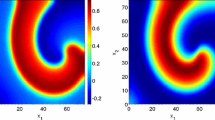Abstract
The article deals with an optimal control problem for the model system described by the one-dimensional inhomogeneous diffusion-wave equation that is a generalization of the wave equation to the case when the time derivative is replaced with the fractional Caputo derivative. In the general case, we consider both boundary and distributed controls which are Lebesgue \( p \)-summable functions, with \( p>1 \) and \( p=\infty \). We state and study the two types of optimal control problems: The problem of finding a minimal norm control for a given control time and the performance problem of finding a control that brings the system to a given state in the minimal time for a given constraint on the control norm. The study bases on using an exact solution to the diffusion-wave equation, which allows us to reduce the optimal control problem to an infinite-dimensional \( l \)-moment problem. We also examine the similar finite-dimensional \( l \)-moment problem that uses an approximate solution to the diffusion-wave equation and analyze the well-posedness and solvability of this problem. Also, we exhibit some example of calculating the boundary control by using the finite-dimensional \( l \)-moment problem.


Similar content being viewed by others
References
Mophou G.M., “Optimal control of fractional diffusion equation,” Comput. Appl. Math., vol. 61, no. 1, 68–78 (2010).
Tang Q. and Ma Q., “Variational formulation and optimal control of fractional diffusion equations with Caputo derivatives,” Adv. Difference Equ. (2015) (Article no. 283; 14 pp.).
Zhou Z. and Gong W., “Finite element approximation of optimal control problems governed by time fractional diffusion equation,” Comput. Appl. Math., vol. 71, no. 1, 301–318 (2016).
Kilbas A.A., Srivastava H.M., and Trujillo J.J., Theory and Applications of Fractional Differential Equations, Elsevier, Amsterdam, Boston, and Heidelberg (2006).
Butkovskii A.G., Distributed Control Systems, Elsevier, New York (1969).
Sandev T. and Tomovski Z., “The general time fractional wave equation for a vibrating string,” J. Phys. A: Math. Theoret., vol. 43, no. 5, Paper ID 055204 (2010).
Agrawal O.P., “Fractional variational calculus in terms of Riesz fractional derivatives,” J. Phys. A: Math. Theoret., vol. 40, no. 24, 6287–6303 (2007).
Kubyshkin V.A. and Postnov S.S., “Time-optimal boundary control for systems defined by a fractional order diffusion equation,” Autom. Remote Control, vol. 79, no. 5, 884–896 (2018).
Author information
Authors and Affiliations
Corresponding author
Additional information
Translated from Vladikavkazskii Matematicheskii Zhurnal, 2022, Vol. 24, No. 3, pp. 108–119. https://doi.org/10.46698/s3949-8806-8270-n
Rights and permissions
About this article
Cite this article
Postnov, S.S. Optimal Control for Systems Modeled by the Diffusion-Wave Equation. Sib Math J 64, 757–766 (2023). https://doi.org/10.1134/S0037446623030242
Received:
Accepted:
Published:
Issue Date:
DOI: https://doi.org/10.1134/S0037446623030242




